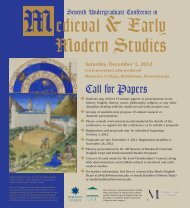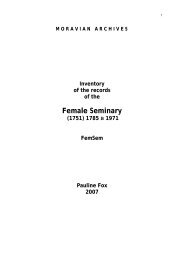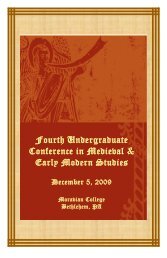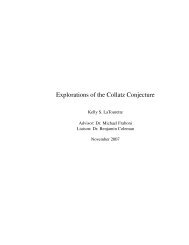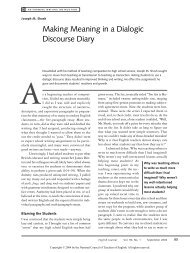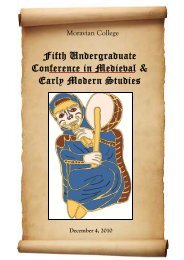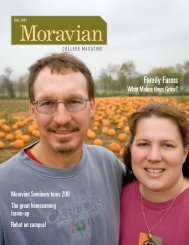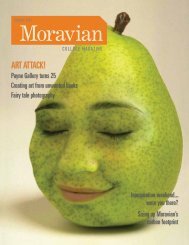Prelude: The Chipmunk Connection - Moravian College
Prelude: The Chipmunk Connection - Moravian College
Prelude: The Chipmunk Connection - Moravian College
You also want an ePaper? Increase the reach of your titles
YUMPU automatically turns print PDFs into web optimized ePapers that Google loves.
Brave New Words<br />
Sandra Novack-Gottshall ’98 forges life as a successful fiction writer.<br />
By Kate Helm ‘05<br />
><br />
S<br />
andra Novack-Gottshall ’98 doesn’t want to write—she needs<br />
to. She compares her devotion to writing to that of a friend for<br />
her son who is going through the “terrible two” stage.<br />
“Once something is yours, and you love it, and it’s in your<br />
bones and blood and heart and head, you can’t just give it up when<br />
things become rough,” she says. “I wouldn’t stop focusing on writing<br />
or fiction any more than she’d give up her son. It doesn’t work<br />
like that.”<br />
Indeed, the fiction industry can be unpredictable. Random<br />
House published her first novel, Precious, last year. Despite the<br />
struggling economy and shake-ups at the publishing house, Precious<br />
was hailed as a top ten debut novel of the year. With a collection<br />
of short stories set to be published next year and work<br />
underway on a new novel, Resurrection Fern, Novack-Gottshall<br />
is quick to point out that accolades are not necessarily a reliable<br />
forecast of future success.<br />
“I’m harder on myself than anyone else is or ever could be,<br />
and whatever successes I have never seem to be good enough,”<br />
she says. “Not everything in a writer’s life comes down to one<br />
book or even two, but rather the entirety of the career. Writers<br />
are built over lifetimes, not a single book or event. Again,<br />
you go back to basics after everything is said and done: you<br />
get up, you write.”<br />
Although she writes predominantly in the morning,<br />
inspiration keeps her on-call, often striking in the middle of<br />
the night. She also gets new ideas from her reading; other<br />
writers are the best mentors, she says. A self-described<br />
recluse, she believes that tendency is an integral part of<br />
her life as a fiction writer. In order to breathe life into another<br />
world, she has to disengage from her own reality.<br />
“[Writing] takes time, physical time, during which<br />
you are away from other people and other things,” she<br />
explains. “With a short story, you might go a week or more before<br />
your mother calls and asks why she hasn’t heard from you. When<br />
writing a novel, you might go months ignoring friends, more or<br />
less, and cutting your social engagements down to practically nonexistent<br />
status. And then there is the psychological aspect of it: the<br />
deeper you are into a novel, the more ‘there’ rather than ‘here’ you<br />
are. Writers get called anti-social a lot, but really I think it’s necessary<br />
to the craft.”<br />
<strong>The</strong> trade-off for those sacrifices comes in the cathartic release<br />
of thoughts and emotions the page provides. Novack-Gottshall<br />
18 MORAVIAN COLLEGE MAGAZINE SUMMER 2010




